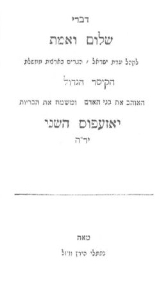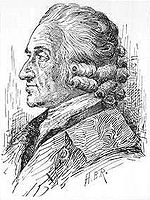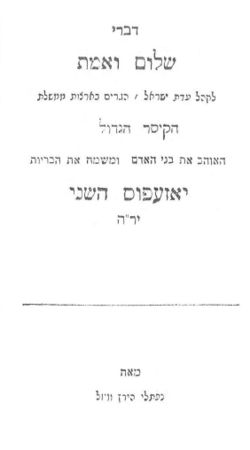
Naphtali Hirz Wessely
Encyclopedia

Hamburg
-History:The first historic name for the city was, according to Claudius Ptolemy's reports, Treva.But the city takes its modern name, Hamburg, from the first permanent building on the site, a castle whose construction was ordered by the Emperor Charlemagne in AD 808...
- February 28, 1805, Hamburg) was a 18th-century German
Germans
The Germans are a Germanic ethnic group native to Central Europe. The English term Germans has referred to the German-speaking population of the Holy Roman Empire since the Late Middle Ages....
Jewish Hebraist
Hebraist
A Hebraist is a specialist in Hebrew and Hebraic studies. Specifically, British and German scholars of the 18th and 19th centuries who were involved in the study of Hebrew language and literature were commonly known by this designation, at a time when Hebrew was little understood outside practicing...
and educationist born at Hamburg.
Family History
One of Wessely's ancestors, Joseph Reis, fled from PodoliaPodolia
The region of Podolia is an historical region in the west-central and south-west portions of present-day Ukraine, corresponding to Khmelnytskyi Oblast and Vinnytsia Oblast. Northern Transnistria, in Moldova, is also a part of Podolia...
in 1648 on account of the Chmielnicki persecutions, during which his whole family had perished. After a brief sojourn in Cracow, Reis settled in Amsterdam
Amsterdam
Amsterdam is the largest city and the capital of the Netherlands. The current position of Amsterdam as capital city of the Kingdom of the Netherlands is governed by the constitution of August 24, 1815 and its successors. Amsterdam has a population of 783,364 within city limits, an urban population...
, where he acquired great wealth, and where he, in 1671, was one of the signers of a petition to the Dutch government requesting permission to erect a synagogue. Together with his younger son, Moses (Moses Reis(-)Wessely), Reis later settled in Wesel
Wesel
Wesel is a city in North Rhine-Westphalia, Germany. It is the capital of the Wesel district.-Division of the town:Suburbs of Wesel include Lackhausen, Obrighoven, Ginderich, Feldmark,Fusternberg, Büderich, Flüren and Blumenkamp.-History:...
on the Rhine, whence the family name "Wessely" originated. In the synagogue at Wesel are still (as of 1906) preserved some ritual paraphernalia presented to it by Moses Reis Wessely, who, upon the advice of the Prince of Holstein
Holstein
Holstein is the region between the rivers Elbe and Eider. It is part of Schleswig-Holstein, the northernmost state of Germany....
, whose purveyor he was, removed to Glückstadt
Glückstadt
Glückstadt is a town in the Steinburg district of Schleswig-Holstein, Germany. It is located on the right bank of the Lower Elbe at the confluence of the small Rhin river, about northwest of Altona...
, then the capital of Sleswick. He established there a factory of arms. King Frederick VI of Denmark
Frederick VI of Denmark
Frederick VI reigned as King of Denmark , and as king of Norway .-Regent of Denmark:Frederick's parents were King Christian VII and Caroline Matilda of Wales...
later sent Moses to Hamburg as his agent, and while there he transacted important business for Peter the Great also.
Moses' son, Issachar Ber Wessely, was the father of Naphtali Hirz.
Biography
Naphtali Herz Wessely passed his childhood at CopenhagenCopenhagen
Copenhagen is the capital and largest city of Denmark, with an urban population of 1,199,224 and a metropolitan population of 1,930,260 . With the completion of the transnational Øresund Bridge in 2000, Copenhagen has become the centre of the increasingly integrating Øresund Region...
, where his father was purveyor to the king. In addition to rabbinical studies under Jonathan Eybeschütz
Jonathan Eybeschutz
Jonathan Eybeschutz , was a Talmudist, Halachist, Kabbalist, holding positions as Dayan of Prague, and later as Rabbi of the "Three Communities": Altona, Hamburg and Wandsbek. With Jacob Emden, he is well known as a protagonist in the Emden-Eybeschütz Controversy.-Biography:Eybeschütz's father was...
, he studied modern languages. As the representative of the banker Feitel, he later visited Amsterdam, where he published (1765-66) his Lebanon, or Gan Na'ul, a philological investigation of Hebrew roots and synonyms. Although prolix in style, and lacking scientific method, this work established his reputation. After his marriage at Copenhagen, he represented Feitel at Berlin, and there became associated with Mendelssohn
Moses Mendelssohn
Moses Mendelssohn was a German Jewish philosopher to whose ideas the renaissance of European Jews, Haskalah is indebted...
. Wessely encouraged the latter in his labors by publishing Alim li-Terufah, a work advocating the "bi'ur" and the translation of the Bible
Bible
The Bible refers to any one of the collections of the primary religious texts of Judaism and Christianity. There is no common version of the Bible, as the individual books , their contents and their order vary among denominations...
into German. To this work Wessely himself contributed a commentary on Leviticus
Leviticus
The Book of Leviticus is the third book of the Hebrew Bible, and the third of five books of the Torah ....
(Berlin, 1782), having published, two years previously, a Hebrew edition of the Book of Wisdom
Book of Wisdom
The Book of Wisdom, often referred to simply as Wisdom or the Book of the Wisdom of Solomon, is one of the deuterocanonical books of the Bible. It is one of the seven Sapiential or wisdom books of the Septuagint Old Testament, which includes Job, Psalms, Proverbs, Ecclesiastes, Song of Solomon ,...
(?), together with a commentary. He died in Hamburg on February 28, 1805.
His works

Patent of toleration
The Patent of Toleration was an edict issued in 1781 by the Holy Roman Emperor, Joseph II of Austria. The Patent extended religious freedom to non-Catholic Christians living in Habsburg lands, including Lutherans, Calvinists, and the Greek Orthodox. Specifically, these members of minority faiths...
). He even risked his reputation for piety by publishing a manifesto in eight chapters, entitled Divre Shalom ve-Emet (Words of Peace and Truth
Words of Peace and Truth
Words of Peace and Truth was a Hebrew work produced by the Jewish scholar Naphtali Herz Wessely, a disciple of Moses Mendelssohn and a prominent figure of the Haskalah....
), in which he emphasized the necessity for secular instruction, as well as for other reforms, even from the points of view of the Mosaic law and the Talmud
Talmud
The Talmud is a central text of mainstream Judaism. It takes the form of a record of rabbinic discussions pertaining to Jewish law, ethics, philosophy, customs and history....
. This work has been translated into French
French language
French is a Romance language spoken as a first language in France, the Romandy region in Switzerland, Wallonia and Brussels in Belgium, Monaco, the regions of Quebec and Acadia in Canada, and by various communities elsewhere. Second-language speakers of French are distributed throughout many parts...
as Instructions Salutaires Addressées aux Communautés Juives de l'Empire de Joseph II. (Paris, 1792), into Italian
Italian language
Italian is a Romance language spoken mainly in Europe: Italy, Switzerland, San Marino, Vatican City, by minorities in Malta, Monaco, Croatia, Slovenia, France, Libya, Eritrea, and Somalia, and by immigrant communities in the Americas and Australia...
by (Goerz, 1793), and into German
German language
German is a West Germanic language, related to and classified alongside English and Dutch. With an estimated 90 – 98 million native speakers, German is one of the world's major languages and is the most widely-spoken first language in the European Union....
by David Friedländer
David Friedländer
David Friedländer, sometimes spelled Friedlander was a German Jewish banker, writer and communal leader.- Life :Friedländer settled in Berlin in 1771...
under the title Worte der Wahrheit und des Friedens (Berlin, 1798). By thus espousing the cause of reform, as well as by his support of M. Mendelssohn, Wessely incurred the displeasure of the rabbinical authorities of Germany and Poland, who threatened him with excommunication.
His enemies, however, were finally pacified through the energetic intervention of the Italian rabbis, as well as by Wessely's pamphlets Meḳor Ḥen, in which he gave evidence of his sincere piety. In 1788 Wessely published in Berlin his ethical treatise Sefer ha-Middot (The Book of Virtues), a work of Musar Literature
Musar literature
Musar literature is the term used for didactic Jewish ethical literature which describes virtues and vices and the path towards perfection in a methodical way.- Definition of Musar literature :...
. He also published several odes; elegies, and other poems; but his masterwork is his Shire Tif'eret (5 vols.; i.-iv., Berlin, 1782-1802; v., Prague, 1829), describing in rhetorical style the exodus from Egypt. This work, through which he earned the admiration of his contemporaries, was translated into German (by G. F. Hufnagel and Spalding
Spalding
-Places:Australia* Spalding, South Australia, a town north of the Clare Valley* Spalding, Western Australia, a suburb of GeraldtonCanada* Spalding, Saskatchewan, a village* Spalding No...
; 1789-1805), and partly into French (by Michel Berr; Paris, 1815). His commentaries on the Bible were published by the society Meḳiẓe Nirdamim (Lyck, 1868-75) under the title Imre Shefer.
Wessely influenced his contemporaries in various directions. As a scholar he contributed, by his profound philological researches, to the reconstruction of the language of the Bible, though his work is marred by prolixity and by his refusal to admit shades of meaning in synonyms. As a poet he possessed perfection of style, but lacked feeling and artistic imagination. No one exerted a greater influence than he on the dissemination of modern Hebrew, and no one, on the other hand, did more to retard the development of pure art and of poetic intuition. Because of the perfidious battle which he fought on behalf of Jewish "emancipation," Wessely may be regarded as a leader of the Maskilim.
Jewish Encyclopedia bibliography
- Abraham Meldola, Ḳol ha-Ẓirim, Altona, 1808;
- M. Mendelssohn, Pene Tebel, Amsterdam, 1872;
- Ha-Asif, iii.404-416;
- N. Slouschz, Renaissance de la Littérature Hébraïque, ch. ii, Paris, 1903;
- David FriedrichsfeldDavid FriedrichsfeldDavid Friedrichsfeld was a German-Jewish writer in German and Hebrew.Friedrichsfeld was born in Berlin, where he absorbed the scholarship and ideas of the Meassefim. In 1781 he went to Amsterdam, where he was one of the leaders in the fight for the emancipation of the Jews, writing in the...
, Zeker le-Ẓaddiḳ, Amsterdam, 1809; - W. A. Meisel, Leben und Wirken des Naphtali Hirz Wessely, Breslau, 1841;
- ZeitlinZeitlinZeitlin is a matronymic Jewish surname. It is derived from the female name Zeitl according to the rules of Slavic languages, with the possessive suffix '-in' and literally means "Zeitl's"....
, Bibl. Hebr.; - A. Benesra, in Ost und West, May, 1905;
- D. Simonsen, "Hartvig Wessely's Todestag," in Monatsschrift, 1905, pp. 205–208.

